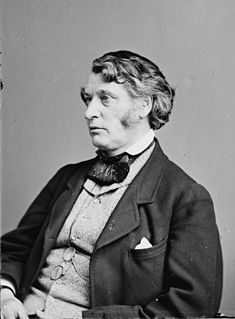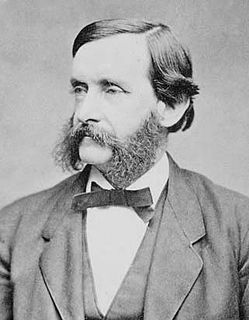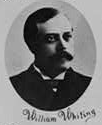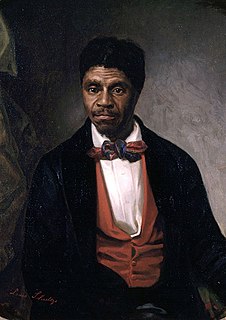Related Research Articles

Henry Wilson was the 18th vice president of the United States (1873–75) and a senator from Massachusetts (1855–73). Before and during the American Civil War, he was a leading Republican, and a strong opponent of slavery. Wilson devoted his energies to the destruction of the "Slave Power" – the faction of slave owners and their political allies which anti-slavery Americans saw as dominating the country.

Harriet Elisabeth Beecher Stowe was an American abolitionist and author. She came from the Beecher family, a famous religious family, and is best known for her novel Uncle Tom's Cabin (1852), which depicts the harsh conditions for enslaved African Americans. The book reached millions as a novel and play, and became influential in the United States and Great Britain, energizing anti-slavery forces in the American North, while provoking widespread anger in the South. Stowe wrote 30 books, including novels, three travel memoirs, and collections of articles and letters. She was influential for both her writings and her public stances and debates on social issues of the day.

William Dean Howells was an American realist novelist, literary critic, and playwright, nicknamed "The Dean of American Letters". He was particularly known for his tenure as editor of The Atlantic Monthly, as well as for his own prolific writings, including the Christmas story "Christmas Every Day" and the novels The Rise of Silas Lapham and A Traveler from Altruria.

This section of the Timeline of United States history concerns events from 1860 to 1899.

Joseph Story was an American lawyer and jurist who served on the Supreme Court of the United States from 1812 to 1845, during the Marshall Court and early-Taney Court eras. He is most remembered for his opinions in Martin v. Hunter's Lessee and The Amistad case, and especially for his magisterial Commentaries on the Constitution of the United States, first published in 1833. Dominating the field in the 19th century, this work is a cornerstone of early American jurisprudence. It is the second comprehensive treatise on the provisions of the U.S. Constitution and remains a critical source of historical information about the forming of the American republic and the early struggles to define its law.

Charles Sumner was an American politician and United States Senator from Massachusetts. As an academic lawyer and a powerful orator, Sumner was the leader of the anti-slavery forces in the state and a leader of the Radical Republicans in the U.S. Senate during the American Civil War. During Reconstruction, he fought to minimize the power of the ex-Confederates and guarantee equal rights to the freedmen. He fell into a dispute with fellow Republican President Grant over the control of Santo Domingo leading to the stripping of his power in the Senate and his subsequent effort to defeat Grant's re-election.

Richard Henry Dana Jr. was an American lawyer and politician from Massachusetts, a descendant of a colonial family, who gained renown as the author of the classic American memoir Two Years Before the Mast. Both as a writer and as a lawyer, he was a champion of the downtrodden, from seamen to fugitive slaves and freedmen.
The Radical Republicans were a faction of American politicians within the Republican Party of the United States from around 1854 until the end of Reconstruction in 1877. They called themselves "Radicals," with a goal of immediate, complete, permanent eradication of slavery, without compromise. They were opposed during the War by the moderate Republicans, and by the pro-slavery and anti-Reconstruction Democratic Party as well as liberals in the North during Reconstruction. Radicals led efforts after the war to establish civil rights for former slaves and fully implement emancipation. After weaker measures in 1866 resulted in violence against former slaves in the rebel states, Radicals pushed the Fourteenth Amendment and statutory protections through Congress. They disfavored allowing ex-Confederate officers to retake political power in the South, and emphasized equality, civil rights and voting rights for the "freedmen," i.e. people who had been enslaved by state slavery laws within the United States.

Charles Francis Adams Sr. was an American historical editor, writer, politician, and diplomat. He was a son of President John Quincy Adams and grandson of President John Adams, about whom he wrote a major biography.

George Sewall Boutwell was an American politician, lawyer, and statesman from Massachusetts. He served as Secretary of the Treasury under U.S. President Ulysses S. Grant, the 20th Governor of Massachusetts, a Senator and Representative from Massachusetts and the first Commissioner of Internal Revenue under U.S. President Abraham Lincoln. He was a leader in the impeachment of U.S. President Andrew Johnson.

Thomas Wentworth Higginson was an American Unitarian minister, author, abolitionist, and soldier. He was active in the American Abolitionism movement during the 1840s and 1850s, identifying himself with disunion and militant abolitionism. He was a member of the Secret Six who supported John Brown. During the Civil War, he served as colonel of the 1st South Carolina Volunteers, the first federally authorized black regiment, from 1862–1864. Following the war, Higginson devoted much of the rest of his life to fighting for the rights of freed people, women and other disfranchised peoples.

Sir William Wilson Hunter was a Scottish historian, statistician, a compiler and a member of the Indian Civil Service.

Emory Washburn was a United States lawyer, politician, and historian. He was Governor of Massachusetts for one term, and served for many years on the faculty of Harvard Law School. His history of the early years of the Massachusetts Supreme Judicial Court is still considered a foundational work on the subject.

The Slave Power or Slaveocracy was the perceived political power in the U.S. federal government held by slave owners during the 1840s and 1850s, prior to the Civil War. Antislavery campaigners during this period bitterly complained about what they saw as disproportionate and corrupt influence wielded by wealthy Southerners. The argument was that this small group of rich slave owners had seized political control of their own states and were trying to take over the federal government in an illegitimate fashion in order to expand and protect slavery. The argument was widely used by the Republican Party that formed in 1854–55 to oppose the expansion of slavery.

William Whiting was a United States Representative from Massachusetts. He was born in Concord on March 3, 1813. He attended Concord Academy and graduated from Harvard University in 1833. He taught school in Plymouth and Concord. Whiting graduated from Harvard Law School in 1838. He was admitted to the bar the same year and commenced practice in Boston. He served as solicitor of the War Department 1862-1865. In 1868 he was a presidential elector, and in 1872 was elected as a Republican to the Forty-third Congress. He served from March 4, 1873, until his death in Boston on June 29 that same year. His interment was in Sleepy Hollow Cemetery in Concord.
James R. Osgood (1836–1892) was an American publisher known for his involvement with the publishing company that would become Houghton Mifflin.
Lorenzo Sabine was a U.S. Representative from Massachusetts now more remembered for his research and publishing concerning the Loyalists of the American Revolution than as a public servant.

This timeline of events leading to the American Civil War is a chronologically ordered list of events and issues which historians recognize as origins and causes of the American Civil War. These events are roughly divided into two periods: the first encompasses the gradual build-up over many decades of the numerous social, economic, and political issues that ultimately contributed to the war's outbreak, and the second encompasses the five-month span following the election of Abraham Lincoln as President of the United States in 1860 and culminating in the capture of Fort Sumter in April 1861.
Every Saturday (1866–1874) was an American literary magazine published in Boston, Massachusetts. It was edited by Thomas Bailey Aldrich and published by Ticknor and Fields (1866–1868); Fields, Osgood, & Co. (mid-1868–1870); James R. Osgood & Co. (1871–1873); and H. O. Houghton & Co. (1874).

Ulysses S. Grant was the 18th president of the United States (1869–1877) following his success as military commander in the American Civil War. Under Grant, the Union Army defeated the Confederate military, secession and the war, which ended with the surrender of Robert E. Lee's army at Appomattox Court House. As president, Grant led the Radical Republicans in their effort to eliminate vestiges of Confederate nationalism and slavery, protect African American citizenship, and pursued Reconstruction in the former Confederate states. In foreign policy, Grant sought to increase American trade and influence, while remaining at peace with the world. Although his Republican Party split in 1872 as reformers denounced him, Grant was easily reelected. During his second term the country's economy was devastated by the Panic of 1873, while investigations exposed corruption scandals in the administration. While still below average, his reputation among scholars has significantly improved in recent years because of greater appreciation for his commitment to civil rights, moral courage in his prosecution of the Ku Klux Klan, and enforcement of voting rights.
References
- Myers, John L. "The Writing of History of the Rise and Fall of the Slave Power in America," Civil War History, June 1985, Vol. 31 Issue 2, pp 144-162
- Wilson, Henry. The History of the Rise and Fall of the Slave Power in America, 3 vols. Boston: J.R. Osgood & Co., 1872–1877. ISBN 0-8371-1293-1 (v. 1)